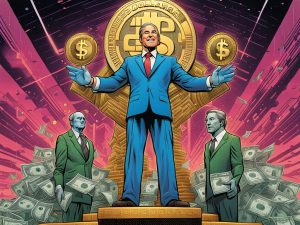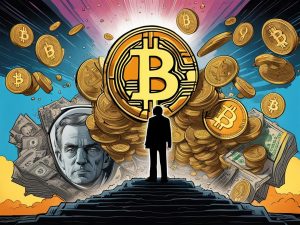The Debate Over Centralization: What Does It Mean for You as a Crypto Investor?
Imagine you’re at a party, and someone brings up a controversial topic—like pineapple on pizza. Pretty soon, half the room is passionately arguing for it, while the other half insists it’s a culinary crime. Now, switch that scene to the world of cryptocurrency, where we’re talking about Solana and its approach to decentralization. This debate isn’t just an academic discussion; it can seriously impact your investment decisions. So, let’s break this down.
Key Takeaways
- Centralization vs. Decentralization: Solana aims for speed and efficiency but raises concerns about its centralization, as pointed out by whistleblower Edward Snowden.
- Community Responses: Solana advocates defend the network’s resilience against centralization criticisms, arguing that achieving disruption is practically insurmountable.
- Market Implications: The back and forth between blockchain networks can affect investor confidence, highlighting the need for diligence in research.
- Innovation on the Horizon: Initiatives like Firedancer are underway to enhance decentralization for the Solana network, aiming to resolve past issues.
The Current Landscape of Solana
So, here’s the deal. Edward Snowden recently stirred the pot in the crypto community by suggesting that networks like Solana prioritize speed over true decentralization. He argued that this could lead to vulnerabilities, particularly if governmental entities decided to target the network. That’s a pretty bold statement, especially since decentralization is cornerstone to the ethos of blockchain technology.
Naturally, Solana’s advocates quickly came to its defense, claiming these criticisms are unfounded and challenge Snowden to back up his assertions with solid evidence. You’ve got to admire their passion; it’s a bit like a sports rivalry, where team spirits run high. Mert Mumtaz, co-founder of Helius Labs, even called out the need for concrete examples to support such claims.
The Centralization Conundrum
You might be wondering, “Does it even matter if Solana is centralized?” Well, consider this: centralization can lead to points of failure. If a single node can take down the network or if control is concentrated in a few hands, that’s a risk for anyone invested. The idea is that a truly decentralized network is less likely to be manipulated or influenced by external factors.
Critics have argued that Solana could face significant challenges if “dishonest entities” gained enough influence over its stake-based system, which could halt block production. On the flip side, advocates argue that the chances of such an event happening are slim, especially with Solana’s high market cap of around $69 billion. Basically, the stakes are high, both literally and figuratively.
Stay Smart: What Should You Do as an Investor?
Here are a few practical tips for navigating this complex environment:
- Do Your Own Research: Always investigate beyond the headlines and seek multiple sources. Check out forums, podcasts, and even Twitter debates to get a full picture.
- Watch for Innovations: Pay attention to developments like Solana’s upcoming Firedancer initiative, which aims to increase decentralization and could significantly affect network reliability.
- Understand Risks: Know the fundamentals of the networks you invest in. A solid grasp of the underlying technology can help you make decisions based on your risk appetite.
- Follow the Community: Engaging with the crypto community can provide insights you might miss in traditional news outlets. Twitter, Reddit, and Discord are solid starting points.
My Two Cents
Honestly, the drama feels a bit like watching a reality TV show unfold. You’re not just looking at cold hard facts; you’re diving into an emotional world filled with loyalty and passion. For me, as an analyst, I see both sides of the coin—centralization does raise flags while emerging technologies aim to mitigate these issues.
Let’s also consider the broader landscape. The centralization debate is not just limited to Solana. Ethereum, Bitcoin, and even newer entries face scrutiny. How should we value the various ecosystems? That’s something I think about often. Each has its strengths and weaknesses, and it’s crucial to assess which aligns with your investment goals.
Final Thoughts
So, here’s the million-dollar question: In a world that’s always evolving, how much do we prioritize decentralization over speed and efficiency? It’s a broad question, but as an investor, understanding these nuances can really shape your strategies. What matters more to you when investing in cryptocurrencies: the speed of transactions or the assurance that they are decentralized? That’s something worth pondering as you navigate this fast-paced market.





 By
By
 By
By
 By
By
 By
By

 By
By